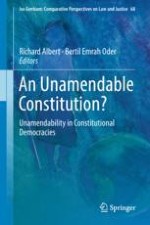2018 | OriginalPaper | Buchkapitel
Unamendable Constitutional Provisions and the European Common Constitutional Heritage: A Comparison Among Three Waves of Constitutionalism
verfasst von : Valentina Rita Scotti
Erschienen in: An Unamendable Constitution?
Aktivieren Sie unsere intelligente Suche, um passende Fachinhalte oder Patente zu finden.
Wählen Sie Textabschnitte aus um mit Künstlicher Intelligenz passenden Patente zu finden. powered by
Markieren Sie Textabschnitte, um KI-gestützt weitere passende Inhalte zu finden. powered by
